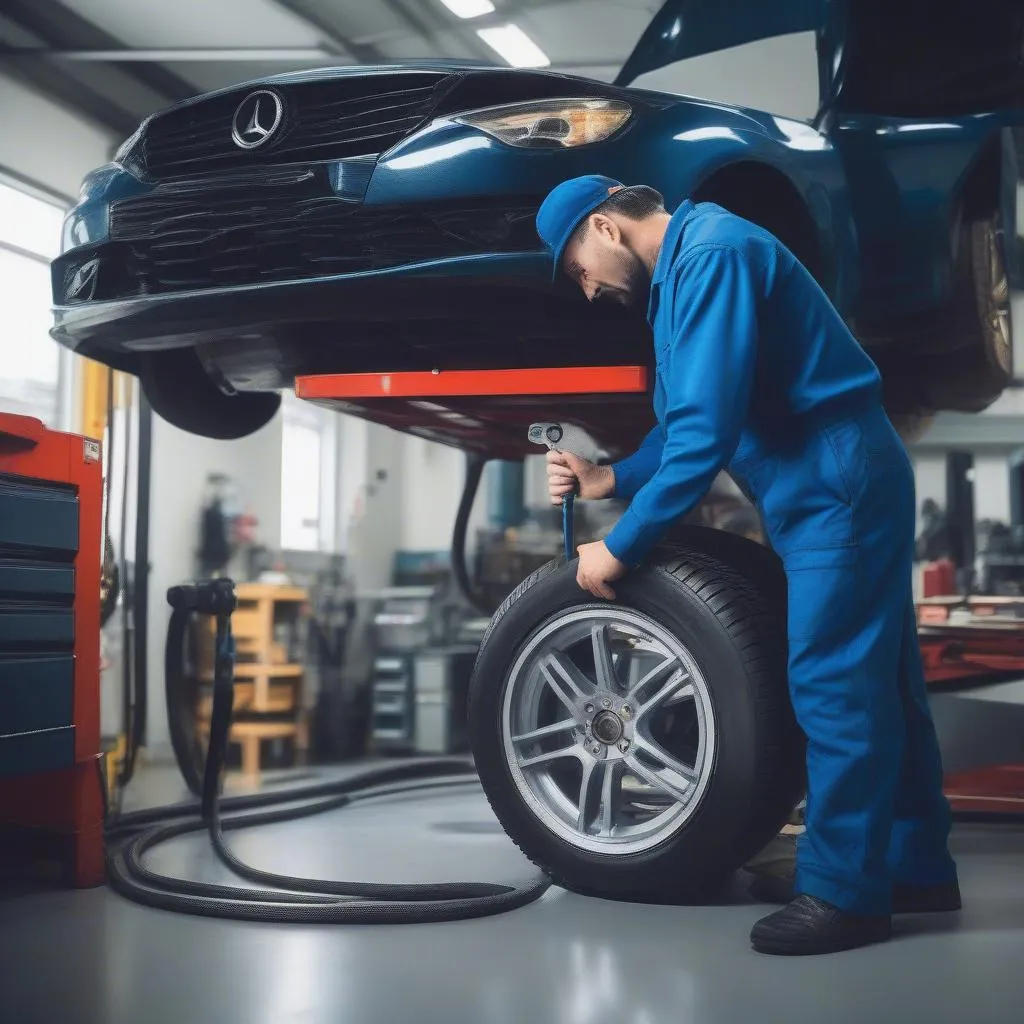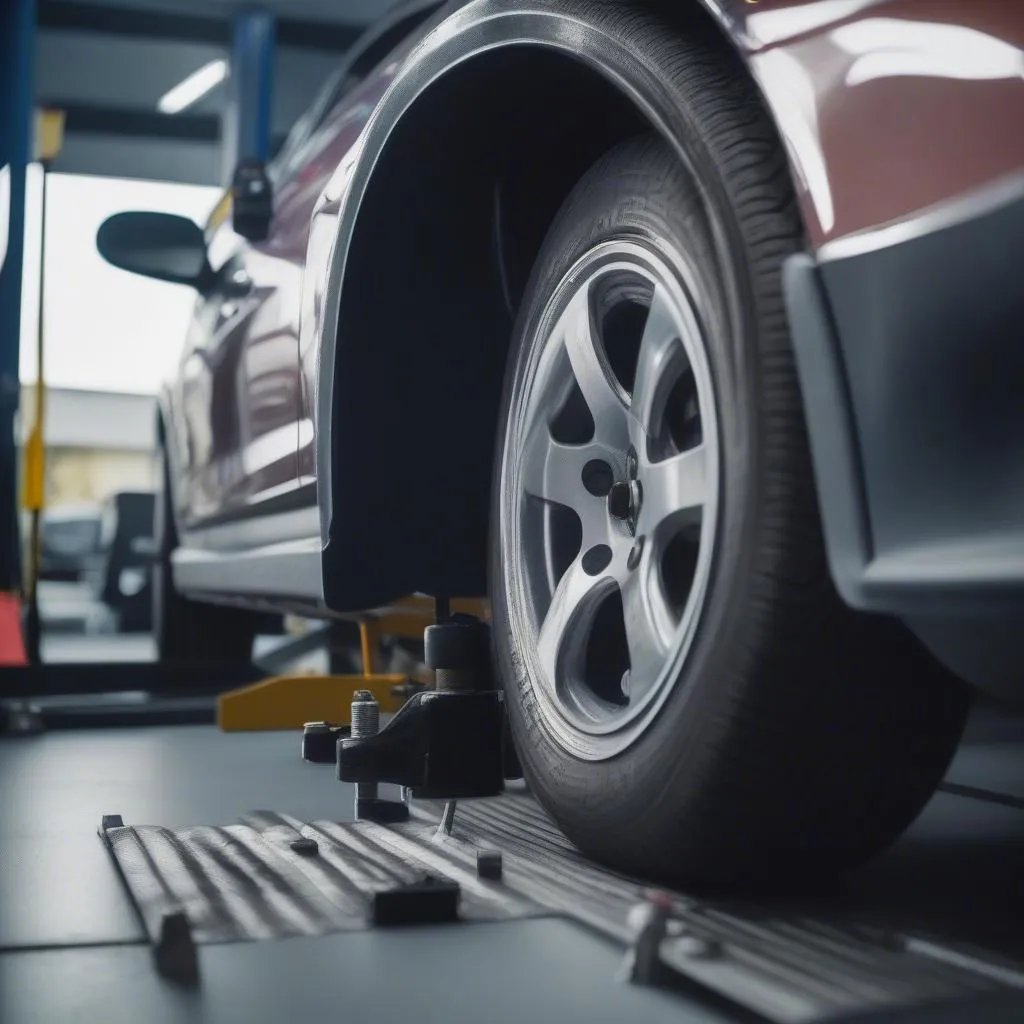Picture this: you’re cruising down the California freeway, sun shining, good music playing, and then it hits. A rhythmic vibration starts in your steering wheel, getting increasingly worse as you accelerate. Not only is it annoying, but it’s a sign that something’s not right with your car. A vibrating wheel at high speed is a common issue, and understanding why it happens can save you a lot of trouble (and money!) down the line.
What Does a Vibrating Wheel at High Speed Really Mean?
Think of your car like a well-oiled machine (because it is!). Each part plays a crucial role in ensuring a smooth and safe ride. When your steering wheel vibrates, especially at higher speeds, it’s often your car’s way of telling you something is off balance or not working as it should. Let’s break down what it could be:
Common Culprits:
-
Tire Trouble: This is the most frequent offender. Worn-out tires, uneven tread wear, or even a tire out of balance can cause those pesky vibrations. Imagine rolling a lopsided ball down a hill – it’s not going to be a smooth ride!
-
Wheel Woes: Your wheels take a beating on the road. A bent wheel, a missing wheel weight, or even loose lug nuts can throw things off balance and cause vibrations.
-
Alignment Issues: Ever driven on a road with a severe slant? That’s what misalignment feels like for your car. It forces your tires to fight against each other, leading to uneven wear and vibration.
-
Suspension System: Your car’s suspension system helps absorb bumps and dips in the road. Worn-out shocks, struts, or other suspension components can transmit vibrations up through the steering wheel.
Less Common, But Still Important:
-
Brake Problems: While less frequent, a warped brake rotor or a sticking caliper can also be the source of those high-speed shudders.
-
Drivetrain Issues: In some cases, problems with the axles, CV joints, or even the driveshaft can manifest as vibrations felt through the steering wheel.
Diagnosing the Shakes: Getting to the Root of the Problem
You wouldn’t ignore a fever, and you shouldn’t ignore a vibrating steering wheel. Here’s how to tackle the issue:
-
Start with the Obvious: Take a good look at your tires. Are they inflated properly? Do you see any signs of uneven wear, bulges, or damage? Check your wheels for any visible bends or dents.
-
Feel for It: Pay attention to when the vibration occurs. Does it worsen at a specific speed? Does it happen while braking or only when accelerating? These clues can help pinpoint the source.
-
Seek Professional Help: If a visual inspection doesn’t reveal the culprit, it’s time to call in the experts. A qualified mechanic with a Dealer Scanner for European Cars (if you drive a European make) can diagnose the issue accurately and recommend the right course of action.
 Mechanic inspecting car tire
Mechanic inspecting car tire
What Happens if You Ignore the Vibrations?
Ignoring a vibrating wheel at high speed is like hitting the snooze button on your health – it might buy you some time, but it will likely come back to bite you later. Here’s why:
-
Safety Hazards: A vibrating wheel can affect your car’s handling and increase your stopping distance, creating a dangerous situation, especially at high speeds.
-
Costly Repairs: What starts as a minor tire issue can snowball into major suspension or brake repairs if left unchecked.
-
Reduced Tire Life: Uneven tire wear means you’ll be replacing your tires more often, digging deeper into your wallet.
Vibrating Wheel at High Speed FAQs:
Q: Can a vibrating wheel fix itself?
A: Unfortunately, no. Mechanical issues rarely resolve themselves. Addressing the problem promptly is key to preventing further damage and ensuring your safety.
Q: I just got new tires, why is my wheel still vibrating?
A: New tires don’t automatically mean problem solved. They may need balancing, or the issue could lie elsewhere, like your wheels or alignment.
Q: How much does it cost to fix a vibrating wheel?
A: The cost depends on the underlying cause. A simple tire balancing might cost a few dollars, while a major suspension repair could run into thousands.
Q: Can a pothole cause wheel vibration at high speeds?
A: Absolutely! Potholes are notorious for damaging tires, wheels, and suspension components, all of which can lead to vibrations.
 Car wheel alignment at auto service
Car wheel alignment at auto service
Related Questions You Might Have:
If you’re experiencing vibrations, you might also be wondering about:
- Car Shaking When Speeding Up (Read more: [link to https://diagxcar.com/car-shaking-when-speeding-up/])
- Vibration in Seat at Highway Speeds (Read more: [link to https://diagxcar.com/vibration-in-seat-at-highway-speeds/])
- Car Vibrates at Low Speed (Read more: [link to https://diagxcar.com/car-vibrates-at-low-speed/])
- Why Does My Truck Shake at High Speeds? (Read more: [link to https://diagxcar.com/why-does-my-truck-shake-at-high-speeds/])
Don’t Hit the Road with Uncertainty!
A vibrating steering wheel at high speed is your car trying to tell you something. Ignoring it can lead to bigger problems down the road – literally. By addressing the issue promptly, you’ll ensure a smoother, safer, and more enjoyable driving experience.
Need help diagnosing your car troubles? We’re here to help! Contact us on Whatsapp at +84767531508 for expert assistance with your car diagnostic tools and get back on the road with confidence.